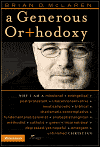A Generous Orthodoxy
 Nietzsche once wrote, "Supposing truth is a woman - what then?" I believe he meant that truth may not be masculine, i.e., logical, objective, hard, and cold, but rather it may be more feminine - indirect, personal, emotional, subjective. Now granted these descriptions of masculinity and femininity are clichéd and simplistic, but Nietzsche's query is nonetheless provocative, and in this day of "post-everything," even helpful. It certainly seems to be helping Brian McLaren, whose latest book, A Generous Orthodoxy, is making quite a stir in the church. So I decided to give it a read, and found it maddening, charming, fascinating, enlightening, optimistic, childlike, naive, hopeful, and in the end an uneven, but therapeutic experience.
Nietzsche once wrote, "Supposing truth is a woman - what then?" I believe he meant that truth may not be masculine, i.e., logical, objective, hard, and cold, but rather it may be more feminine - indirect, personal, emotional, subjective. Now granted these descriptions of masculinity and femininity are clichéd and simplistic, but Nietzsche's query is nonetheless provocative, and in this day of "post-everything," even helpful. It certainly seems to be helping Brian McLaren, whose latest book, A Generous Orthodoxy, is making quite a stir in the church. So I decided to give it a read, and found it maddening, charming, fascinating, enlightening, optimistic, childlike, naive, hopeful, and in the end an uneven, but therapeutic experience.First let me say that there are so many blog-reviews of this book, pro and con, that I am limiting myself to only a couple of points. D.A. Carson, a conservative evangelical, has actually written a book in response to McLaren and the Emerging Church movement. If you want to read his initial assessment, you can go there from this link. McLaren is quite open to criticism, and you can find one of the best critiques from the conservative Reformed writer Michael Horton, on McLaren's own website! Such transparency and willingness to engage in dialogue is quite refreshing in this age of angry polemics - that is, people who merely talk past each other.
Some chapters of this book are so interesting and helpful that they justified its purchase. I especially liked his chapters on catholicism, environmentalism, and anabaptism. So let me begin by saying some good things about this book, and why it deserves the attention it is getting. First, McLaren is an eclectic Christian, rather than a denominational or systematic believer. He likes to collect good things from different Christian traditions and cook up a nourishing goulash of spiritual lessons and practices. As the old proverb says, "Gold in the hands of thieves is still gold."
I also appreciate his ongoing attempt at moving past the liberal/conservative and protestant/catholic logjams. This is the key to his "Third Way" or Emergent Village approach. He calls this simply the "Way of Jesus," which is about integrating "what has gone before so something new can emerge" (p.287). Another strength of this book is the criticism it levels at how propositional, creedal, and fundamentalist theologies focus on who is "in" and who is "out." This focus needs to be replaced with Jesus' focus on moving outward to the world in a missional posture, embracing those of other faiths not as enemies but as fellow pilgrims, who will benefit from learning the way of Jesus, without having to necessarily become "Christianized."
There are some obvious problems and pitfalls to this postmodern, emerging church vision. The Jesus McLaren speaks of seems a bit "made over," made more presentable for the 21st century, than the man we encounter in the gospels. McLaren seems to have a canon within the canon concerning the New Testament, emphasizing carefully selected portions of Matthew and John, while ignoring the many politically incorrect and exclusive statements of Jesus, along with Jesus' inconvenient tendency toward propositional statements, such as, "I am the way..."
Then there is the whole postmodern, relativistic structure of the emerging church vision. Truth is always a lower case "t", and that means certainty goes quickly out the window. Indeed, McLaren's friend Leonard Sweet speaks about "entering the mystery." This can be unsettling for conservatives, but also helpful to those who can't seem to reconcile biblical truth with scientific discoveries, or those who find the whole institutionalized evangelical world a bit too arrogant in its methods and message. In the end, McLaren's vision of the church is definitely a liberal one, yet clothed in conservative dress and open to the historical and magesterial traditions of two thousand years of Christian history.
I found this approach therapeutic because of McLaren's openness, lack of guile, willingness to poke fun at himself, and his courage in taking on some sacred cows and church abuses. I suspect this is merely the beginning of a process, one that shows promise, but faces grave dangers. In the end, being kind to people and being generous, are good things, and a shrill, angry, self-righteous orthodoxy is of no help to anyone.



2 Comments:
I just finished the same book. There were certainly pockets of insight, but I found the book rather unipressive. I walked aways wondering how a person can affirm everything and not be watered down to nothing.
Point well taken. Another reader said to me that he seemed to have no firm ground to stand on.
Post a Comment
<< Home